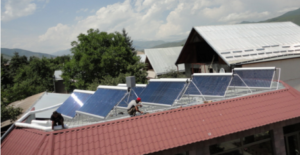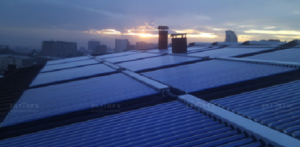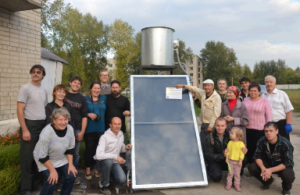EBRD and USAID Promote Solar Thermal in Armenia
March 3, 2014
Cyrs hopes that these projects could serve as examples for other communities and organisations in Armenia. “To us, an ideal project is when we implement clean energy or water practices with partner communities and then, in turn, spark action in neighbouring communities wishing to implement similar projects on their own, because they’ve seen the benefits,” the development adviser says. That`s why on 5 December last year, the CEWP expert organised an exhibition together with producers and suppliers of small-scale energy efficiency equipment, such as solar air and water heaters, in the village of Tatul in western Armenia.
|
Country / Region |
The Caucasian countries Armenia and Georgia |
|
Name of programme |
Caucasus Energy Efficiency Program II (CEEP II) |
|
Type of incentive |
Combination of loans and grants for private companies and individuals for energy efficiency and renewable energy investments |
|
Eligible technologies |
Solar water heaters, solar cooling systems and solar thermal dryers among other energy efficiency measures and renewable energy technologies |
|
Applicable sectors |
Residential and commercial |
|
Amount |
Up to USD 2.5 million for corporate customers |
|
Maximum incentive |
10-15% of the eligible loan amount |
|
Requirements for system |
Not specified |
|
Requirements for installation |
Not specified |
|
Finance provider |
Commercial banks, leasing companies and microfinance institutions that are eligible to receive loans by EBRD to pass them over to residential and commercial clients Cartu Bank Ameriabank Energy Efficiency Loan Bank of Georgia Anelik Bank TBC Bank: Energy Efficiency Loan II BoG Energy Efficiency Loan II ACBA Energy Efficiency SEF International Credo Georgia Bank Republic |
|
Total funds |
USD 40 million |
|
Funding sources |
EBRD for loans European Union’s Neighbourhood Investment Facility (EU-NIF) and EBRD Special Shareholders Fund for incentives |
|
Effective date |
July 2013 |
|
Expiration date |
– |
|
Website |
|
|
Last review of this tabloid |
March 2014 |
|
Contact |
Christopher Falco Internet: http://www.ebrd.com |
|
Country / Region |
The Caucasian countries Armenia and Georgia |
|
Name of programme |
Caucasus Energy Efficiency Program II (CEEP II) |
|
Type of incentive |
Combination of loans and grants for private companies and individuals for energy efficiency and renewable energy investments |
|
Eligible technologies |
Solar water heaters, solar cooling systems and solar thermal dryers among other energy efficiency measures and renewable energy technologies |
|
Applicable sectors |
Residential and commercial |
|
Amount |
Up to USD 2.5 million for corporate customers |
|
Maximum incentive |
10-15% of the eligible loan amount |
|
Requirements for system |
Not specified |
|
Requirements for installation |
Not specified |
|
Finance provider |
Commercial banks, leasing companies and microfinance institutions that are eligible to receive loans by EBRD to pass them over to residential and commercial clients Cartu Bank Ameriabank Energy Efficiency Loan Bank of Georgia Anelik Bank TBC Bank: Energy Efficiency Loan II BoG Energy Efficiency Loan II ACBA Energy Efficiency SEF International Credo Georgia Bank Republic |
|
Total funds |
USD 40 million |
|
Funding sources |
EBRD for loans European Union’s Neighbourhood Investment Facility (EU-NIF) and EBRD Special Shareholders Fund for incentives |
|
Effective date |
July 2013 |
|
Expiration date |
– |
|
Website |
|
|
Last review of this tabloid |
March 2014 |
|
Contact |
Christopher Falco Internet: http://www.ebrd.com |


